Please use the following link to download the September 11, 2021 issue of the syəcəb
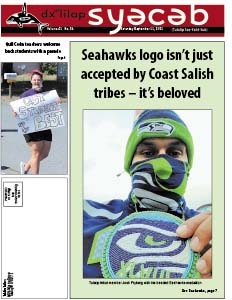
syəcəb

By Micheal Rios, Tulalip News
There is no such thing as a seahawk. This may come as a surprise to some Seattle football fans who, while tuned into this weekend’s 2021 NFL Kickoff, may be unaware of the origin of their home team’s logo. Some might even assume that, as an appropriated Indigenous design, it falls under the banner of problematic logos, like those of a handful of other sports franchises, such as the Cleveland Indians or the Kansas City Chiefs.
But unlike those teams, whose logos are founded on stereotypes (as opposed to any specific aspect of one of Native America’s 574 federally recognized tribes) the Seattle Seahawks’ logo is that rarest of birds: a culturally accurate sports icon directly inspired from an Indigenous masterpiece — and embraced by the Indigenous People it is borrowed from.
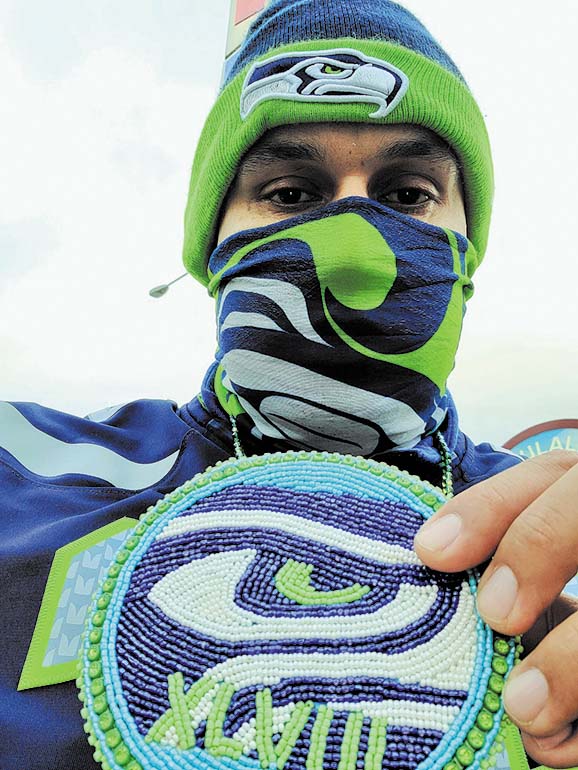
Anatomy of a logo
Ornithology experts theorize the term seahawk refers to a combination of an osprey, which is a bird of prey native to coastal North America, and a skua, which, in the Pacific Northwest, we normally call a seagull. So if there isn’t an actual “seahawk” found in nature, then where did the inspiration for the Seattle Seahawks’ logo come from?
The general consensus is that in 1976 the NFL commissioned a logo for the newly formed Seattle football team. Then-General Manager Ted Thompson wanted the Seahawks’ logo to reflect “Northwest Indian culture.” He and his team of concept designers must have been Native culture enthusiasts who stumbled across a truly remarkable piece of Indigenous Northwest Coastal art. That artwork in question was a Kwakwaka’wakw (pronounced: KWA-kwuh-kyuh-wakw), a transformation mask from northeastern Vancouver Island.
In September 2014, the Burke Museum, located on the University of Washington campus, learned of the mask’s whereabouts and launched an online fundraising campaign to bring it back to the Northwest Coast. It didn’t take long to raise the money needed to conserve, insure and ship the mask across the country. Within weeks of arrival the hidden history of the mask was unveiled and the origin story of the Seahawks logo went public.
While the details behind the origin story of the Seahawks’ logo remained a mystery for decades, what has always been certain is its positive celebration by local Coast Salish tribes. All along the Salish Sea, tribal people have embraced the Seahawks logo and re-appropriated it into our culture.
“Great things inspire imitations. In the same way that so many Native people and white people and Asians are inspired by hip-hop, an art form created by Black people, many people are inspired by our beautiful art,” said attorney and Seattle resident Gyasi Ross (Blackfeet). “Native people have some beautiful artwork, and of course it inspires people to want a piece of it. The Seahawks logo is a perfect example of that. And we love it.
“But also, the Seahawks are actually active and respectful of the huge Native community here in the Pacific Northwest,” he added. “From speaking at graduations to speaking out against the [Washington] Redskins mascot, the Seahawks have a great relationship with the Native community here, both urban and Reservation-based.”
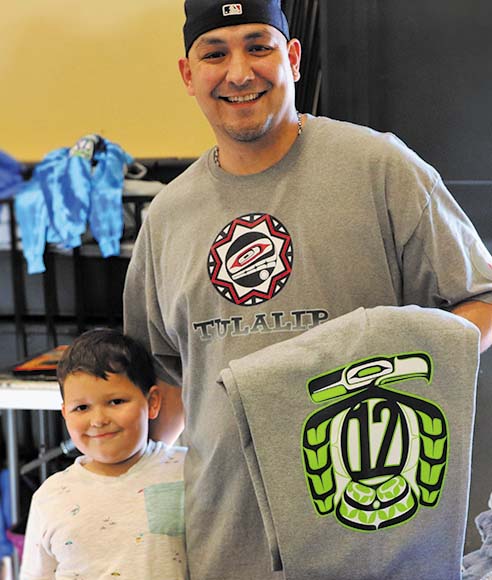
A team that uplifts
Their commitment to Native communities is what distinguishes the Seahawks from so many other organizations that claim to honor Native culture with their logos and mascots, yet contribute little or nothing to their local tribes. The Seahawks have a history of making significant impact to the Tulalip Tribes in particular.
Back in 2008, Seahawk Bobby Engram collaborated with Home Depot, the Kaboom! Program, and Boys & Girls Clubs of Snohomish County to build a 50-by-50-foot playground at the reservation’s ‘Club.’ In 2014, following a shooting at the Marysville-Pilchuck High School, the Seahawks hosted tribal member Nate Hatch, who was shot and survived, along with his family at CenturyLink Field (now Lumen Field), where they received the VIP treatment from players and coaching staff.
Then in June 2019, Seattle Seahawks legend Michael Bennett hosted a once-in-a-lifetime football camp for Tulalip community youth. Nearly 250 participants ages 7 to 18 had an opportunity to catch a pass from and do drills with the Super Bowl champion. Afterwards, Bennett stuck around to sign autographs and take photos with every single one of his adoring fans. Most recently, in October 2019, former Seahawks Cooper Helfet and Jermaine Kearse landed a seaplane right in Tulalip Bay before spending an afternoon with 30 Tulalip youth.
A history of positive impact. Countless moments to uplift Tulalip youth and inspire them to always dream big. Promoting healthy lifestyle choices and physical fitness as a means of self-discipline to achieve long-term goals. The reciprocal nature of Seahawk respect and appreciation for local tribes and the proud Native fandom they’ve received in return continues to manifest itself in truly imaginative ways.
For starters, it’s common to see the Seahawks’ logo reimagined via Coast Salish designs in all possible mediums. Native artisans have reproduced it as blankets, clothing, beaded jewelry, eye-capturing medallions, wooden panels, furniture, flags, face masks and even six-foot-tall chainsaw carvings that celebrate the Seahawks’ Native roots. These items and more can routinely be found at powwows, all-Native basketball tournaments and other Native vendor-friendly events around the region.
“The Seahawks have given back to our community in so many ways and really made a difference in the lives of our youth,” shared lifelong fan and Tulalip tribal member Josh Fryberg, whose family of eight buys new Seahawks jerseys representing their favorite players every year. “As for the connection between the Seahawks and Coast Salish art, the roots definitely run deep. For my family, we have a lot of Seahawks-themed artwork created by very talented Native artists, both from Tulalip and other tribes. More than the art though, the Seahawks mean family togetherness. Every Blue Friday we rock our jerseys and every game day we gather as a family to cheer on our Seahawks.”
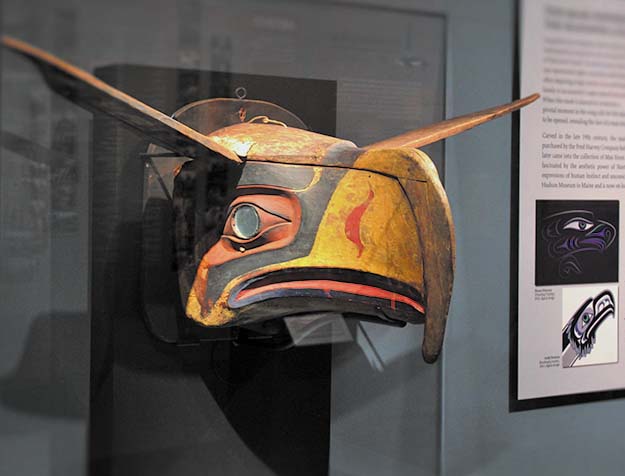
The unique partnership between the Seahawks organization and Coast Salish tribes who comprise part of the devout 12th Man fan base takes on a new, awe-inspiring form outside of Lumen Field. Dubbed “Muckleshoot Plaza”, the field’s north entrances have been adorned by Indigenous artwork. Featuring a massive seahawk, two salmon, a traditional dugout canoe and written Lushootseed, the impossible to miss architecture designed by Muckleshoot artists serve to remind all who pass by that they are guests on Coast Salish land.
“This artwork will not only inspire our communities, but also educate them on the important history of the Native Americans in this region,” said Chuck Arnold, President of the Seattle Seahawks. “We look forward to a long and meaningful partnership for many years to come.”
Whether the Seattle Seahawks make it to this year’s Super Bowl or not, in the hearts and minds of thousands of Coast Salish tribal members, they will always be champions. Not because of a Vince Lombardi Trophy, but because our football team respects their local Native communities off the field — where it matters most.
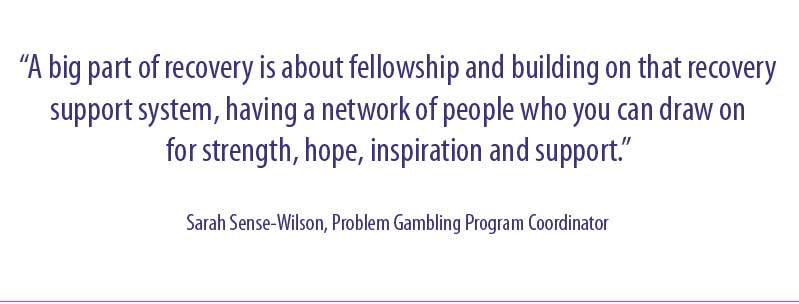
By Kalvin Valdillez, Tulalip News
“During recovery, it’s really important that your family has an understanding of the addiction, because if you’re not an addict, you just won’t understand it,” said Tulalip Problem Gambling Counselor, Robin Johnson “Especially gambling. Gambling is hugely overlooked as being an addiction, so the family is left thinking, why? Why can’t you just pull yourself up, why can’t you quit, it doesn’t make any sense to them.”
The Tulalip Problem Gambling Program is inviting you to their upcoming virtual event that will take place on September 30, from 5:00 p.m. to 6:30 p.m. Known as Family Night, the monthly event is more than just a social gathering for recovering addicts and their families, but a support group where both friends and family members of recovering excessive gamblers can get a better understanding of the addiction.
Recovery can be a strenuous journey full of ups and downs as well as milestones and setbacks. Families are often affected throughout the process and also carry the burden of the addiction as well, whether that’s financially, emotionally, mentally, physically or all of the above. The Family Night support group is an opportunity for family and friends to learn about the many tribulations they could face while helping their loved ones on the road to recovery, while also getting insight to what fuels the addiction and how they can help end an often-vicious cycle of trying to hit it big.
The monthly gathering also features guest speakers on occasion, providing recovering addicts and members from groups such as gambler’s anonymous and al-anon a space to share their story, to help serve as inspiration to those in recovery and provide any helpful tips or suggestions to family members, friends and compulsive gamblers alike, as they’re in the same journey together. And if you’ve ever attended a Problem Gambling event in the past, then you already know that it is sure to be an entertaining evening with fun and educational activities and plenty of good-medicine-laughs to go ‘round.
As a people, Native Americans are at the highest risk of developing a gambling habit. According to a 2019 study conducted by the National Institute on Alcohol and Related Conditions, 2.3% of the entire Indigenous population are battling gambling addiction, one of the highest percentages in the nation. Sarah Sense-Wilson, the Problem Gambling Program Coordinator, predicts those numbers will be on the rise because of COVID-19. Due to restrictions and stay-at-home orders, the amount of online gambling and sports betting is projected to be much higher than usual over the past two years.
Sarah shared, “There’s been a lot more relapse and people gambling. Whether that’s online gambling or gaming or other forms of gambling, there has been an increase since COVID and it’s been harder for people to really grab ahold of recovery.”
For this reason, it is important that those individuals, who are attempting to escape the grips of excessive gambling, have a strong support group of people they can rely on when the going gets tough. Family Night is the perfect opportunity for recovering gambling addicts to start and build that support system.
“A big part of recovery is about fellowship and building on that recovery support system, having a network of people who you can draw on for strength, hope, inspiration and support,” Sarah expressed. “There’s still a lot of stigma around this particular addiction. Gambling disorder is a disease, it is an addiction. There’s still huge denial throughout Indian Country and mainstream as well. We’re still way far behind in accepting, acknowledging and supporting people to get help. It’s a hidden illness.”
If you wish to be member of this monthly support group, to better understand the disease and learn how you can assist someone during their recovery journey, all you have to do is RSVP with the Problem Gambling program at (360) 716-4304. And on the day of the event, Thursday September 30 at 5:00 p.m., simply enter this Zoom ID number: 313 507 8314 on either the Zoom app or at www.Zoom.us Family Nights are held once a month on every third Thursday.
“Family Nights are really important,” Robin stated. “Because it’s not just as easy as sending your person to treatment and they fix them there and send them back home. The education is a requirement that we have for our clients, that one of their family members or friends attends Family Night during their treatment to gain an understanding. Family Night is about education and gaining information about gambling addiction. We always offer resources, so that beyond us, they have a resource list that they can go to and access.”
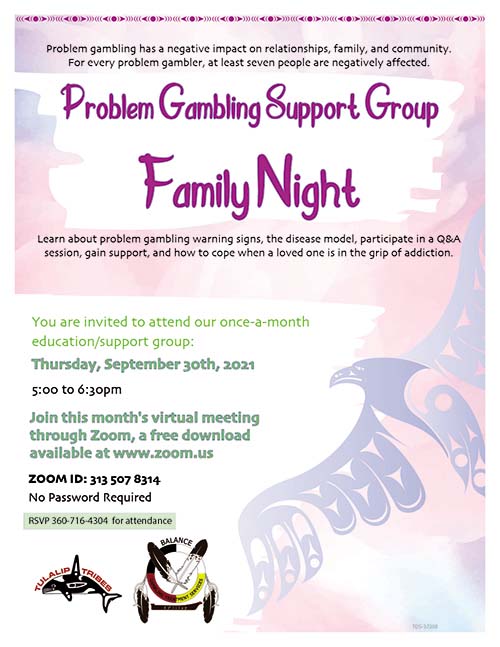
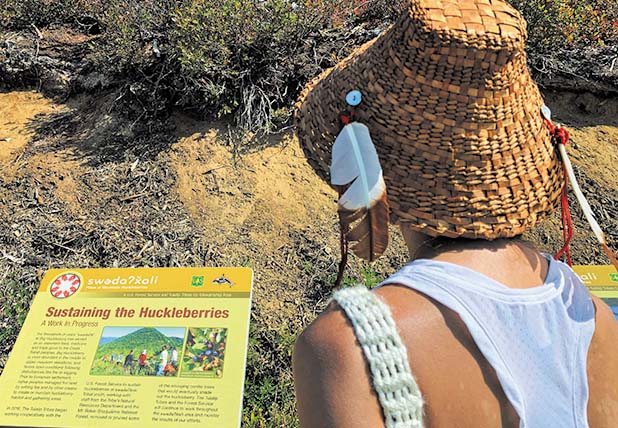
By Micheal Rios, Tulalip News
For thousands of years, huckleberry has served as an important food, medicine, and trade good to the Coast Salish peoples. Mountain huckleberry is most abundant in the middle to upper mountain elevations, and favors open conditions following disturbances like fire or logging. Prior to European colonization, Native peoples managed ideal harvesting locations by using fire and other traditional means to maintain huckleberry growth for sustainable picking.
In 2011, the Tulalip Tribes began working cooperatively with the U.S. Forest Service to sustain huckleberries at a 1,280-acre parcel of land, 4,700 feet above elevation in the upper Skykomish River watershed. This particular location is one of several co-stewardship areas throughout the Mt. Baker-Snoqualmie National Forest where Tulalip collaborates with the Forest Service to preserve and maintain important cultural resources.
“It is not only important that we continue the struggle to uphold our treaty rights, but we need to be involved in taking care of those resources our culture depends on so they will be available to future generations.”
– Wisdom from elder Inez Bill
Named swədaʔx̌ali, Lushootseed for ‘Place of Mountain Huckleberries’, this end of summer destination gives Tulalip tribal members an opportunity to walk in the steps of their ancestors and harvest the highly prized mountain huckleberry. The gate to swədaʔx̌ali was officially opened on August 23 and will remain opened, tentatively, through the end of September.
Northwest mountain huckleberries generally ripen in the late summer and can be picked into the early fall. Huckleberry, well-known for boosting the immune system and being rich in antioxidants, has always had a strong relationship to the area’s Indigenous cultures. Coast Salish tribes consider the huckleberry to be an important dietary staple because of its medicinal properties and sweet, delicious taste.
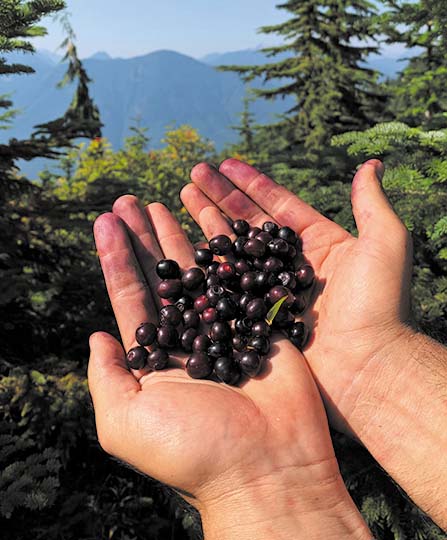
“Huckleberry is a food and medicine to our people,” explained Tulalip elder Inez Bill. “Our ancestors visited certain areas for gathering these berries. They knew where the berries were growing, what companion plants were growing there too, and how to use them.
“Through the teachings of how we value, take care of and utilize our environment, we pass down our history and traditions, and what is important to the cultural lifeways of our people,” she continued. “This connection to the land enables us to know who we are as a people. It is a remembrance. Today, it is not only important that we continue the struggle to uphold our treaty rights, but we need to be involved in taking care of those resources our culture depends on so they will be available to future generations.”

swədaʔx̌ali is a prime example of how Tulalip is diligently working to reclaim traditional areas. Stemming directly from the Point Elliot Treaty, which secured claims to gather roots and berries in all open and unclaimed land, the ‘Place of the Mountain Huckleberries” is clear expression of Tulalip’s sovereignty.
Embracing that sovereignty is every tribal member who journeys to this ancestral harvesting area and practices their cultural traditions that continue to be passed on from one generation to the next. The mountain huckleberry is intimately tied with traditional Tulalip lifeways and culture.
Historically providing an end of summer harvest opportunity, the journey to swədaʔx̌ali strengthens a deep connection to the land. Nearly 5,000 feet up, in the Mt. Baker-Snoqualmie National Forest, berry pickers are completely immersed in the grand splendor that is the Pacific Northwest. Epic views of luscious, green-filled forestry, towering mountains, and clear waterways can be mesmerizing.
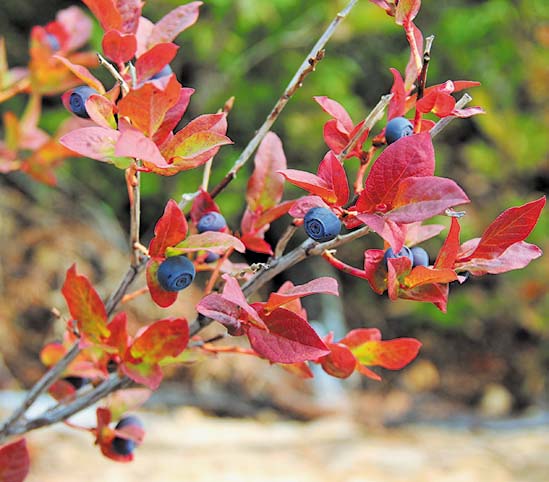
“It was a beautiful, uplifting experience. Once we hit the forest, where there were no buildings, no cars, no people, just trees…my spirit soared,” said Lushootseed teacher Maria Rios after staining her hands purple from a day of Huckleberry picking. “I’m fortunate to have the opportunity to speak my language, but that is only a piece of my culture. Berry picking feels natural, like I’ve always done it. The smells are intoxicating. The sounds are beautiful, from the buzzing bugs and chirping birds to the gentle breeze rustling the huckleberry leaves. These are the meaningful experiences that we all need to share in.”
Mountain huckleberry season is short, lasting only a few weeks between August and September. The sought after super food and medicine ranges in color from red to deep blue to maroon. They are similar to a blueberry in appearance and much sweeter than a cranberry, with many people rating huckleberries as the tastiest of the berry bunch. The gate to swədaʔx̌ali will only remain opened for a couple more weeks, so don’t miss the opportunity to harvest, take in breathtaking views, and, most importantly, express your tribal sovereignty.
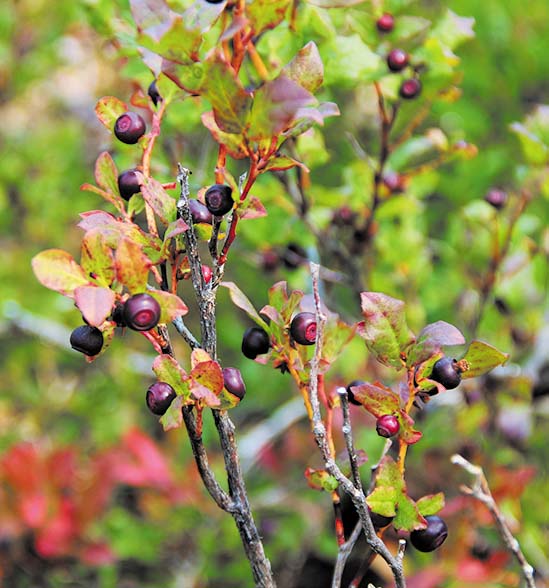
Huckleberry Health Benefits:

By Kalvin Valdillez; photos courtesy of Faith Iukes
Next time you are screen-scrolling on your favorite app, whether it’s YouTube, Facebook, Instagram or TikTok, do yourself a favor and search for the username @faith.iukes11. You will find a number of videos and photos that are guaranteed to brighten your day and boost your serotonin levels, all created by a Tulalip entrepreneur who is making quite the name for herself at the young age of 12.
“My name is Faith Iukes. I’m 12 years old and I work on social media,” she proudly beamed. “I vlog myself every day and I basically share my everyday life.”
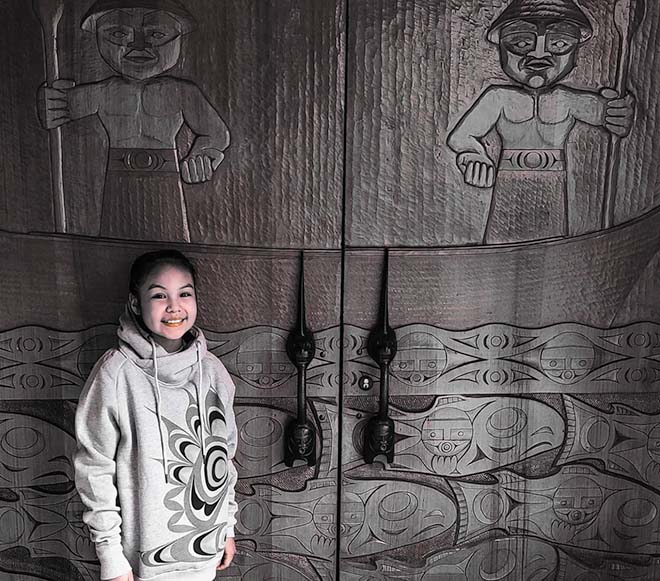
Showcasing stunning camera work and an amazing on-screen presence, Faith is practicing an art that Native peoples have passed through the generations since time immemorial, storytelling. Bringing the tradition to present-day digital platforms, Faith utilizes her gift of storytelling just as her ancestors did before her, documenting the times and culture, making others laugh and smile, and teaching her peers, the next generation, how to be a voice for the people.
With wisdom beyond her years, she passionately shared, “If we are not preparing our youth to become successful, we are not preparing the world for the next group of leaders.”
A natural-born go-getter, Faith creates opportunities by simply being herself, giving the world a first-hand look at what growing up on the Tulalip reservation looks like. Faith’s love for her family, community and homelands shines in each of her videos and photos, whether that’s participating in community events, using a drone to record all the scenic views Tulalip has to offer, or sharing screen time with her friends and family on her daily vlog.
When asked about some of her favorite highlights of her blossoming career, she quickly stated, “Sometimes I do food reviews with my sisters! I love my family and I love social media. This is something that I’ve always wanted to do and when I was younger, I just wasn’t ready yet. COVID came around and my great-grandma passed. Everyone in my family was so sad, I thought I could use this to bring a smile to everybody’s face, so I got on YouTube.”

Not only is she a rising social media star, Faith also possesses impressive filming and editing skills, and she is just as talented behind the camera as she is on-screen. Everything she has created to-date has been self-taught. Through YouTube how-to videos, she learned all of her cutting, sequencing and scoring techniques and she already has a vast knowledge of how to use industry-standard editing software programs such as Adobe Lightroom.
Faith’s father, William Iukes, has also been instrumental in her social media journey so far. In addition to helping her map out her goals, recording additional footage, and learning editing skills to help out when he can, he’s also taken on the role of her manager and helped land her a number of partnerships with other Indigenous artists, creatives, musicians and organizations, ensuring he’s doing everything he can in order for his daughter to exceed her goals.
“She’s bringing a positive message to a lot of our kids out here, especially in Indian Country,” he shared. “The one thing she is really into is helping people with the success she’s getting. Her success is their success. We’ll be at Walmart or somewhere and kids will run up to her, say hi and ask for a selfie. And when they ask how do I become who you are, she stops and tells them, ‘this is who I am and this is what I do. You can do the same thing, you just have to keep believing who are and keep thriving to be the best you.’ That is something that I’m very proud of as a father.”
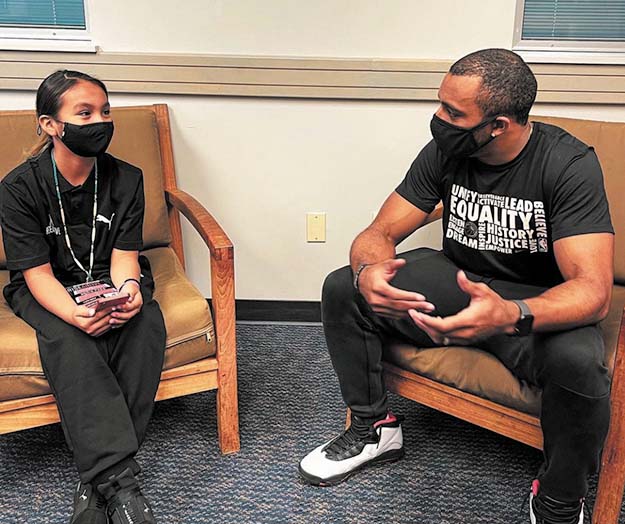
Faith’s hard work is on display in all of her productions and has helped build her personal brand, leading to several partnerships and collaborations. Currently, Faith is sponsored by the local Native clothing company, Salish Style. She was also given an official title as media journalist for Rise Above, an Indigenous non-profit that was established to promote healthy lifestyles and empower Native youth through sports. In fact, she recently attended a Rise Above basketball camp where she got the chance to meet and interview Seattle Seahawk Doug Baldwin.
“I asked him, how much does giving back to the youth mean to him and what inspired him to work with Rise Above. He said it was me, because his daughter watches me. I thought that was really exciting because it wasn’t expected, it was shocking and it made me happy,” she expressed.
During that same basketball camp, she also met representatives of the newly established NHL hockey team, the Seattle Kraken, and she now has plans to work with the team throughout their first season. Also in the works, a future collaboration with Native rappers and actors, Lil’ Mike & FunnyBone, who first gained popularity on America’s Got Talent and are currently starring in the hit TV show, Reservation Dogs.
William stated that Faith is not one to get caught up in the numbers and stats such as the amount of views, clicks, reaches, shares, followers and subscribers, but those numbers continue to climb on the daily. At the time of her sit-down with Tulalip News, Faith said she had a goal to reach 600 subscribers on YouTube and 10,000 followers on TikTok. Her father, who has to follow the numbers as her manager, shared she wasn’t too far off from achieving that goal. Not too long after the interview, she surpassed those numbers. And after this article is published, with your help, she can continue to grow her following, with a simple click of a follow/subscribe button. And in return, you’ll get the opportunity to say that you have followed thee Faith Iukes since the beginning of her career, as she continues to grow and spread good vibes and positivity through her social medias.
Keeping true to one of her main goals of sharing all her self-taught knowledge and skills with other Indigenous youth, a key reason to why she began her influencer journey, Faith shared, “If you want to be a YouTuber but you don’t know how, you don’t need a fancy computer or camera. When I started I only had an iPhone and a rubber ice tray for a tri-pod. You can go out, have fun, be yourself and try your best.”
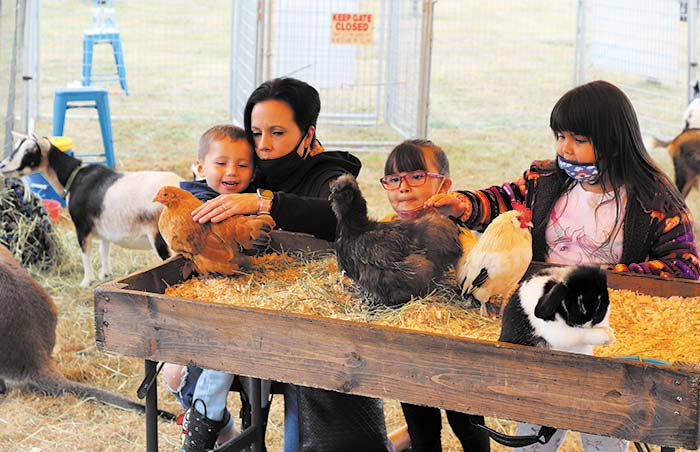
By Micheal Rios, Tulalip News
End of summer signals the official kick-off for the back to school season. In Tulalip, that means Positive Youth Development’s always highly anticipated, annual ‘Back To School Bash’.
Local school-aged children descended to the Reservation’s centrally located Youth Center by the hundreds in order to collect essential school supplies, hygiene kits, and gather information from a variety of community resource booths. The students and their families were eagerly greeted by community friends and a number of educators from Marysville School District who could hardly contain their excitement at finally being reunited with their kids, some of whom they hadn’t seen in person in over a year.
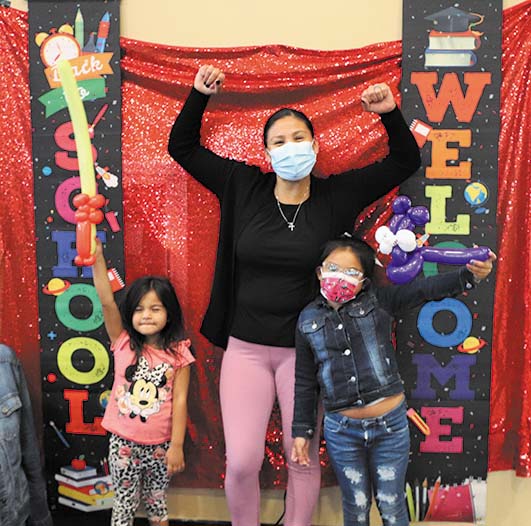
“In my role as both a mom and educator, I’ve attended Tulalip’s back to school event for the last fifteen years,” said Tulalip tribal member Chelsea Craig. “It’s always grounded me as a mother to have access to all the resources the Tribe has to offer, but also the connections with Marysville School District and the outer community. Anytime we can bring together our tribal community with those around us in a positive way, it’s an opportunity to provide healing and create new relationships that can foster true understanding.
“A great memory from today has to be meeting a family who has been completely online since their kids started kindergarten last year,” continued the recently promoted Quil Ceda Elementary assistant principal. “This family had zero in-person contact with our school staff until today. To be able to introduce ourselves and help ease their minds about the transition back to face-to-face learning was priceless.”
The annual Bash looked a little different minus the usual backpack giveaway. However, Youth Development staff were on hand to walk families through a number of financial aid opportunities to receive critical funds for school supplies and other education related costs. Those forms are conveniently located on the website TulalipYouthServices.com
Youth lined up to receive a fresh haircut, to fill their bellies with a BBQ lunch, and to meet all kinds of community resource representatives who can assist them on their educational journey. For the students and their families new to the Tulalip area or the school district, this event was a perfect welcoming.
“After signing up my kids for school, they emailed us a flyer for this event. I think this is so beneficial because my kids really needed the things that are being provided,” shared Puyallup tribal member Angel Berry. She recently moved to the area and looks forward to her three kids attending schools with such a strong connection to Native peoples. “We’ve only been in the area for a few weeks, so this is a good opportunity for us to integrate into the community.”
Among the Bash’s many activities offered were a game of kickball, a BMX demonstration at the skate part, a photo booth, and an immersive petting zoo featuring a baby kangaroo and farm animals. Ever-popular among the tiny tots was a balloon artist who couldn’t buy a break from nonstop requests for light sabers, flower bouquets, and household animals.
New to this year was a full on scholastic book fair. Regardless of reading level or age, students from pre-school up to high school senior could be seen perusing the paperback offerings in search of the perfect end of summer reading material.
“Our goal was to bring everyone together in the best way that we could, in the safest way possible, so our membership could access the resources that they may need for the upcoming school year,” reflected Youth Development manager Josh Fryberg. “We partnered with so many departments from Tribal Government and Marysville School District to make this event happen. Weather it was something simple like getting your kid a haircut or updating their tribal ID, or needing help applying for Covid relief funds and speaking to a local school representative, so many left here satisfied and optimistic for the first day of school. This is what the power of community is all about.”
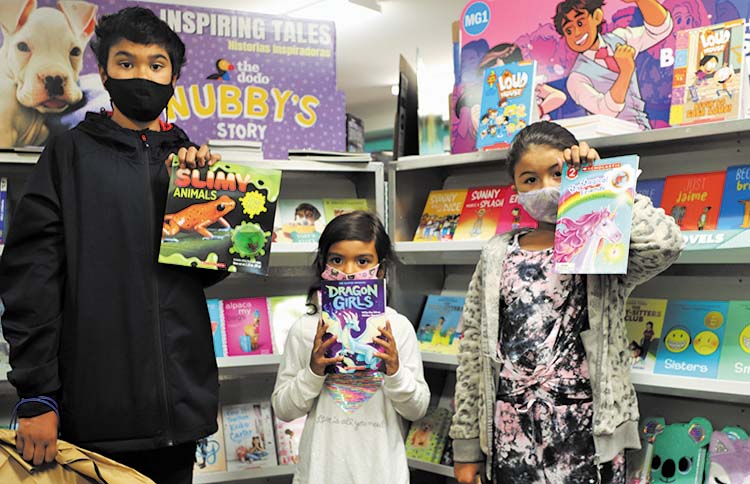
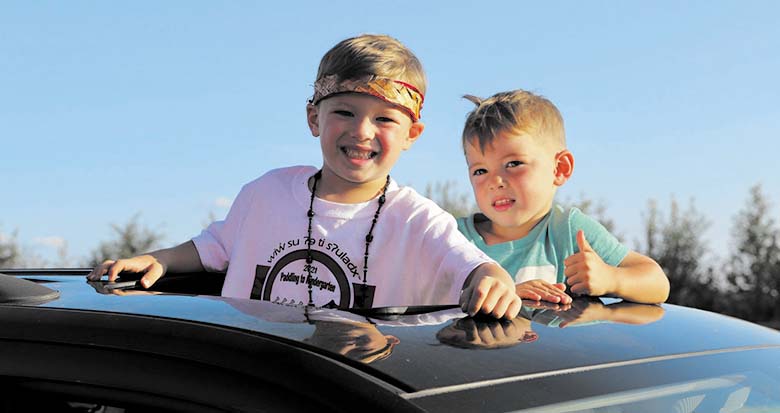
By Kalvin Valdillez, Tulalip News
Seventy-sevin students completed their academic journey at the Betty J. Taylor Early Learning Academy on the evening of August 20th. The future leaders celebrated their graduation with a parade. The kids excitedly waved at their loved ones and teachers, who held up signs and cheered, as they drove through the early learning academy parking lot for one last ride. Come Fall, they will begin a new educational experience at elementary school.

TELA went all out for their graduates and created cedar headbands, Paddling to Kindergarten t-shirts and paper cut-out paddles for the kids to wear and showcase during the ceremony.
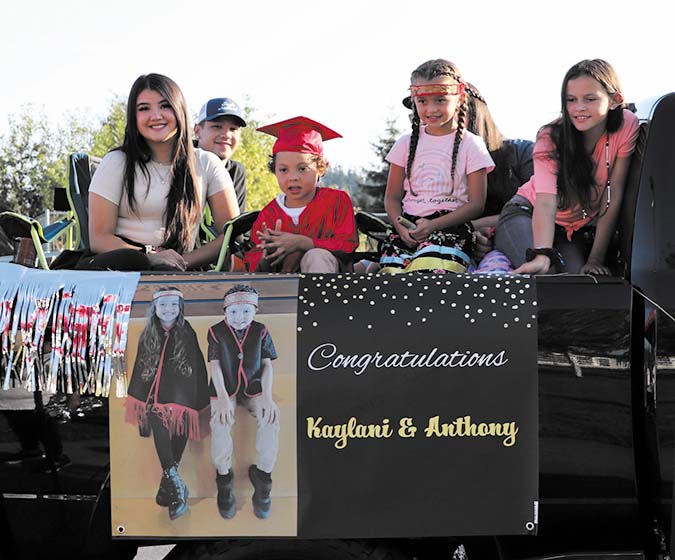
“I have to give so many kudos to all of our teachers and all of our leadership team who worked on this event because they outdid themselves in making all of the children feel special in their graduation,” said TELA Director, Sheryl Fryberg. “They’re paddling to kindergarten and they are so excited and happy. I think the families absolutely love the graduation ceremony this way and I saw them share so many happy smiles and laughter with their kids.”
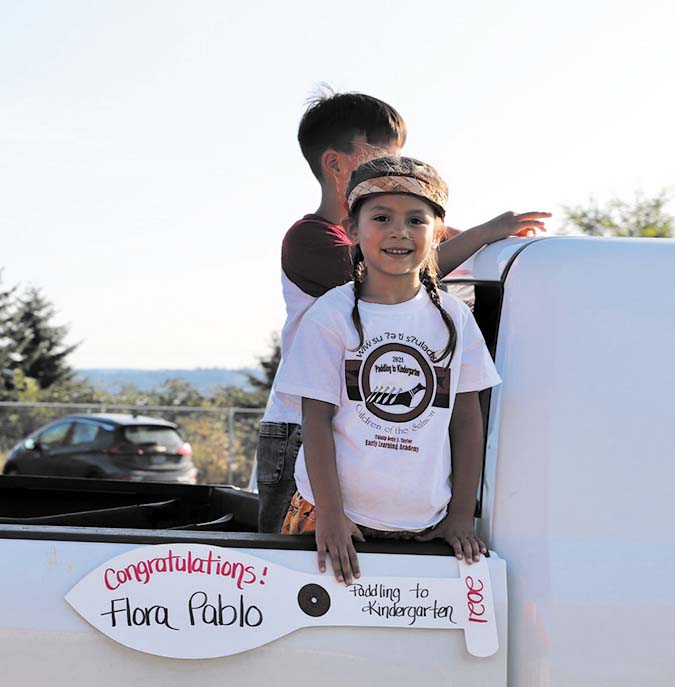
She continued, “This is one of their big milestones. That leap from birth-to-three to pre-school was big but this is huge, where they’re leaving us and moving on to that kindergarten classroom where it’s a totally different world. We’re really excited that we could be a part of it.”
Congratulations to all the graduates and good luck in kindergarten!
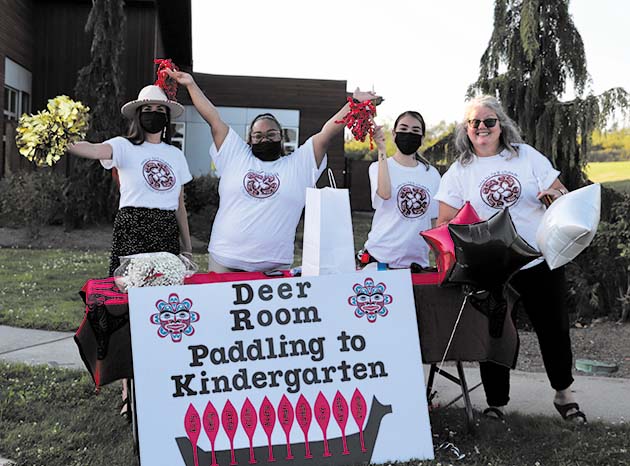

By Micheal Rios; Collection curated by staff of the Tacoma Art Museum
Since time immemorial, Native artists have expressed the cyclical nature of their culture and unique relationship to the world around them via a vast assortment of mediums available at any given time. This connection continues to evolve in the breathtaking artwork put forth by the current generation of Native creatives. From woodcarving and basketry to jewelry making and painting, an essence of the ancestors’ resiliency is felt in new waves of indigenous artistry proudly pushing their culture forward.

Some artists carve or weave following traditions dating back generations, using the same methods and materials their ancestors used. Others have adapted modern day technology to push the bounds of painting and printmaking to explore culture shifting concepts. Such is the case with today’s formline landscape.

Often, when people think of Native art of the Northwest Coast, they think of formline. An artistic style thought to originate from the first peoples of northern British Columbia and Alaska, formline is characterized by free-flowing thick and thin lines often used in combinations of U-shapes, S-shapes and flattened ovals called ovoids. Most commonly rendered in bold black and red colors, these designs often depict animals and cultural spirits on story poles, hand carved paddles and masks, and most recently t-shirts and fine art prints.

Artwork showcasing the distinct Coast Salish formline style became popular during the Alaska gold rush in the 1890s and the Alaska-Yukon-Pacific exhibit in 1909. The demand for formline continued as the prime choice for public exhibitions and private collections at the same time the Pacific Northwest region saw a dramatic boom in development and residency. As the greater Seattle area continued to develop into a tourism hotbed, the formline style eclipsed all other styles indigenous to the region.

Since the explosion of formline onto the mainstream art scene, countless culturally inclined Native peoples from the Northwest Coast have developed their passion for creativity in an era known as Salish Modern. Tuning their skilled artisan abilities to fulfill the demand for popular formline, the latest wave of Coast Salish artists have infused the art world with innovative prints combining storytelling, powerful cultural reflections, and vibrant Native flare. Such are the prints we offer our readers now.

Dubbed ‘Salish imPRINTS’, this collection is created by artists who call the Salish Sea home and is intended to inspire the inner artist in everyone, while enhancing relevant conversations about a shared past, present and future.
